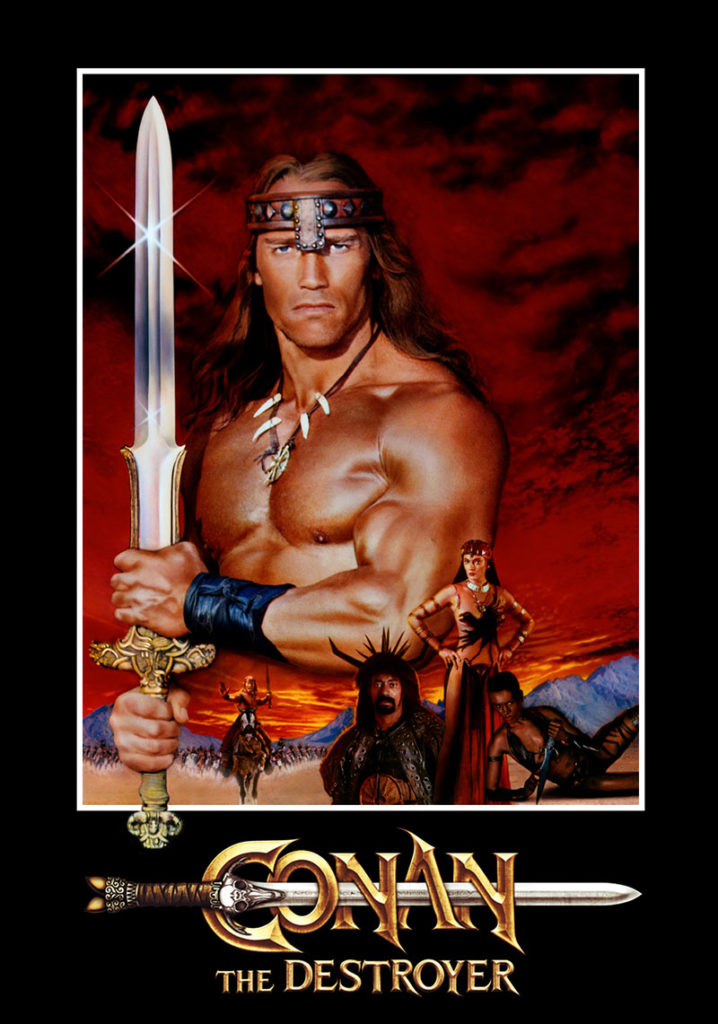Groo the Wanderer...oops, I mean Conan the Destroyer, is the sequel to Conan the Barbarian. Conan the Barbarian represented just about all that was good about the adventure story, even though at times it felt unmercifully cheap. But, my goodness, did it have style. Conan the Destroyer wasn’t a slack-jawed effort at making a sequel, but it was enough of a cash grab that most of what made its predecessor so good has been excised. And it’s a subtle difference. Conan the Destroyer has big guys with swords and axes, exotic people and locales from a mythological past, great shooting locations, and sets that look as if much time and effort were put into them, but it’s mere replica.
Things in Conan the Destroyer are just a little too polished. Interior scenes are a little too obviously filmed on a soundstage. The lighting reveals a bit too much of that wonderful scenery. There’s too much sparkle and lens flare and a bit too much of that Vaseline-on-the-lens look, evoking, for all the wrong reasons, Supergirl, which came out the same year.
But worst of all, it never feels like there is a good movie just waiting to burst its way out. It’s just mediocre.
Conan the Destroyer follows the titular character, of course played by Arnold Schwarzenegger, on further adventures taking place after the first film. In this one, he is recruited by Queen Taramis (Sarah Douglas) to escort her niece, Jehnna (Olivia d’Abo) and bodyguard, Bombaata (Wilt Chamberlain!), on a quest to locate a mystical jewel. On the way, their merry band of adventurers grows to number six, as they are joined by Mako, reprising his role as an eastern mystic from the first film, Tracey Walter as Conan’s partner in thievery, and Grace Jones as, well, visual interestingness. If a viewer may be wondering if any of these people work well in an ensemble, the answer is no. Even though Mako was in the first film, there were really only three main characters in Conan the Barbarian,  and only one of them, Conan, is in this film. There wasn’t a whole lot of chemistry between the old three (Arnold, Gerry Lopez, and Sandahl Bergman) when they were talking, but John Milius made sure huge blocks of his film were devoid of dialogue. It was unique in the way it presented Conan’s adventure as a visual feast, where words were oftentimes superfluous. The sequel has too much talking, yet another way it missed what was good about the first film.
and only one of them, Conan, is in this film. There wasn’t a whole lot of chemistry between the old three (Arnold, Gerry Lopez, and Sandahl Bergman) when they were talking, but John Milius made sure huge blocks of his film were devoid of dialogue. It was unique in the way it presented Conan’s adventure as a visual feast, where words were oftentimes superfluous. The sequel has too much talking, yet another way it missed what was good about the first film.
It’s no bold thing to declare that a sequel is not as good as the original. How does Conan the Destroyer rate as its own film? Surprisingly, much better. If a viewer can manage to put the first film out of their mind, they will have a more enjoyable experience with this film. One of the things which works is the pacing.
I use that word in a reviews a lot. Pacing is supremely important in how a filmmaker tells a story. Good pacing means that scenes never go on too long, there aren’t too many identical scenes in a row, and something eventually happens. That’s the easy quick, one-two-three of filmmaking, yet it’s a skill that some filmmakers either never acquire, or seem to ignore. Good pacing isn’t absolutely necessary for a film to be good, but it helps. Quentin Tarantino makes good films, some great, but there are times when the pacing of his films grinds to a stop.
Conan the Destroyer was helmed by a Hollywood veteran, Richard Fleischer. He had been directing films for forty years by the time Dino De Laurentiis handed him the reins of this film. In his time in Hollywood, he directed the likes of Laurence Olivier, Michael Caine, Peter Ustinov, William Holden, Ernest Borgnine, Oliver Reed, Rex Harrison, Lee Marvin, Charles Bronson, Anthony Quinn, George C. Scott, Mia Farrow, Lee Remick, Janet Leigh, Robert Mitchum, Ray Milland, Joan Collins, Charlton Heston, Edward G. Robinson, Omar Sharif, Peter Lorre, Tony Curtis, Henry Fonda, Richard Attenborough, Raquel Welch, Kirk Douglas, James Mason, and motherfucking Orson Welles. There was no way this guy was going to let a swords and sorcery flick get out of hand.
And he didn’t. Conan the Destroyer’s biggest problem is that it is not as good as its predecessor. It has all the same problems, but none of the charm. I don’t blame Fleischer or Arnold for that. I blame De Laurentiis. That guy was always about the money.
